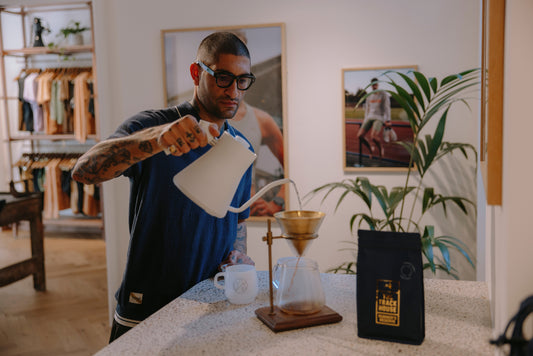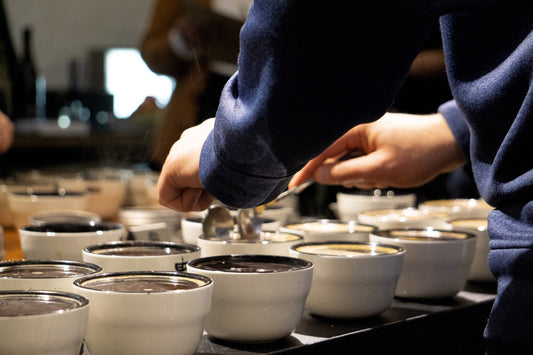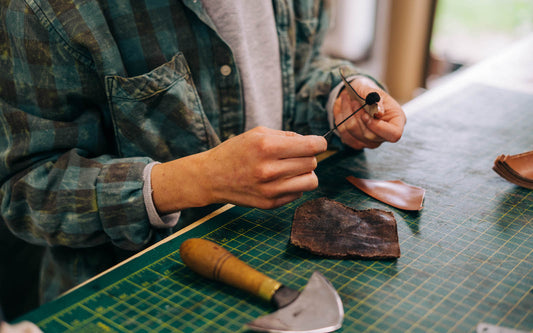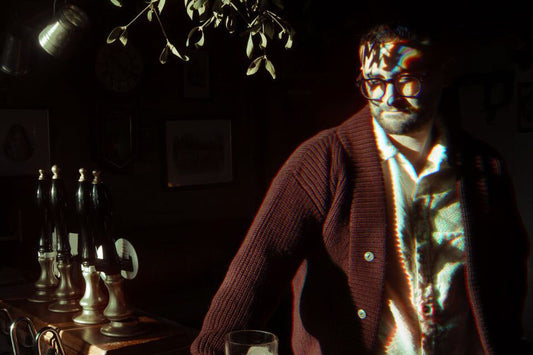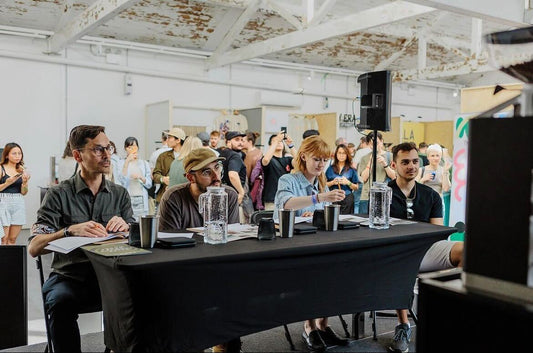Our ‘Love Your Work’ profile series sets out to discover and showcase individuals, organisations and initiatives, all of whom share our commitment to quality.
Previously head chef at The Fat Duck in Bray, and now the Chef Director of Dinner by Heston Blumenthal at the Mandarin Oriental Hotel in Knightsbridge, Ashley Palmer-Watts is one of the most renowned Michelin-starred chefs on the planet.
We travelled over to Dinner to meet Ashley and, amidst the hustle and bustle of one of the world’s best kitchens preparing for its lunch service, we enjoyed a coffee at the Chef’s Table whilst we discussed his upbringing, his journey into the profession, and how relentless passion, focus and innovation keep Dinner at the forefront of the industry.
Did food play an important role in your upbringing?
From a really young age, no. I read a lot of stories about idyllic childhood food, and some of them are probably true, but I reckon a lot of them are pretty embellished, too. I grew up in a village in Dorset and I don’t really remember supermarkets. I remember a Waitrose opening nearby and then a huge Tescos, but we never went. I come from a really normal, working class family, but we had a big, long garden and we grew a lot of vegetables. My grandad also grew some in his garden and in his allotment nearby. It was very well grown produce, it was all very healthy, and that was just normal for me.
I didn’t grow up in a gastronomic family; we ate basic, classic, English staples - lasagne, toad in the hole, stews, barbecues, a roast on Sunday, that kind of thing. Nothing too special. My gran, who lived in the village, was a butcher and had been for fifty years, so we got our meat from the butcher, our bread from the bakery. Without it sounding all romantic, that’s just what everyone in the village did. When I look at it now, I do think “that was quite amazing”.
In which case, how did your journey into the restaurant world begin?
There was a small restaurant in the village called Le Petit Canard, run by a husband and wife team, and I started washing dishes there when I was twelve. It was probably one of the most invaluable turning points in my life and I look at Jeff & Linda, the owners, as parents. When I went through the doors into their little restaurant, it was like entering another world. I started to travel a bit with them -- we went to the Restaurant Show in London, they took me to my first Michelin Star restaurant and they effectively introduced me to the restaurant world and to this incredible way of life (because it’s not a job, it is a way of life).
It was the height of Marco [Pierre White] and chefs were like rock stars -- the way they helped me see that is integral to where I am today.
Which chefs did you really look up to at that time?
A lot! When I left school at sixteen, I started to do a college course one day-a-week whilst I was working at a restaurant. I wasn’t enjoying it so, I wrote to some of the top chefs in Britain at the time -- Raymond Blanc, Pierre Koffmann, Michel Roux Jr., John Burton-Race, Sally Clarke and Nico Ladenis, asking them if a college education was really necessary.
They all replied with varying answers and so, in the end, I decided to ditch the college course and just apply myself to working in a restaurant. I actually then nearly joined the army, but I was too young and they told me to come back in three months. Three months later I’d changed my mind and had decided I wanted to become a chef.
Photo: Joe Sarah
Looking back now, it’s fascinating to hear that all those chefs took the replied to your letter. Does this desire to help young chefs break into the industry still exist today?
Oh, definitely. When we were opening Dinner in Melbourne, we had hundreds of applications, but one that really stood out was a letter from a slightly older guy, a successful graphic designer, who wanted to change careers.
Every now and then someone like that comes along and you think “Okay, why not? We’ll give you a chance”. Another good example is Will Torrent, the pastry chef who does a bit of TV and works for Waitrose -- he came to do a ‘stage’ with me at The Fat Duck when he was fifteen. You can’t really do that anymore because of health and safety, and we wouldn’t have done it normally, but he sent a really great letter and we wanted to give him a chance.
Do you think the increase in reality TV cooking shows and competitions provides more of an opportunity for young chefs to gain recognition?
I’ve been involved in the Australian and UK Masterchef series in recent years and I can tell you, the finalists aren’t naive. Whether they go on to win the competition or not, they know how hard it’s going to be to open a restaurant that’s successful and sustainable.
Kenny Tutt, for example, who won Masterchef in the UK this year, is working incredibly hard at the moment because he knows he has a limited period of time when he’s fresh in people’s minds and he wants to make the most of it. He’s doing a lot of small food festivals around the country, because he’s not going to be offered the big ones straight off the bat, and he knows that you really have to work your way up.
It’s not just about your ability to cook; a huge part of it is putting in the time and effort to make a real difference. Anyone who thinks success comes really quickly in this industry is dreaming, it doesn’t work like that, probably even more so now than fifteen years ago. On the one hand, you have an iPhone and social media to help build your profile and showcase your work, but on the other hand, so do millions of other people. It’s not all about that, it’s about what happens in the dining room day in, day out, and the most important thing is the experience you provide at the dining table.
I read an anecdote online about how during the first few months at the Fat Duck, it was such hard work that some chefs said they were going to the toilet, and then would never come back. Was it really that hard?
We were 100% focused and committed, and there was absolutely nothing else in my life at that point other than what was going on in that restaurant. I was pretty junior, but I was working shoulder to shoulder with a guy [Heston Blumenthal] that was one of the most tirelessly driven people I’ve ever seen in my entire life, and I think that process taught me so much about who I wanted to become. It was a period of time where he was on such a mission to make it work, whatever way he could, and it’s about having that shared ethos -- which exists here at Dinner now too -- to move something forward and achieve that goal.
Meat Fruit, one of Dinner's signature dishes - chicken liver parfait disguised as a Mandarin. Photo: John Blackwell.
And what is that goal?
We can get bogged down in spreadsheets, P&Ls, percentages and staff costs, but those are just measurements that mechanically have to be in line for the business to work.
The goal, ultimately, and without wanting to sound wanky, is to give people incredible experiences whatever the occasion -- whether it’s a Tuesday lunch and they need somewhere to eat, or whether it’s a group that has travelled thousands of miles to be here. Everything else is very important, but it’s secondary. We work really hard to make sure we don’t lose focus on that.
How do you put a value on that experience?
We must always buy the very, very best produce we can get our hands on and so we work incredibly hard on supplier relationships and sourcing with integrity. Meat has to be ethically farmed, fish has to be sustainably caught, and these things all come at a cost. I can tell you where every piece of meat and fish have come from. We go to every farm, we work with the farmers. Even for stocks and sauces, I know the origin of every single ingredient. What we have to do is deliver value for money, whatever that amount of money is.
The one thing we don’t want to be is expensive. Food at this level and complexity does cost more to produce than food at a simple grill restaurant or brasserie. That’s why it has two Michelin stars and I think it’s a case of making sure you deliver on what you set out to.
You mentioned your two Michelin stars. Are they something you actively set out to achieve, or did they come as a byproduct of the exceptional experience you offer?
These awards and accolades, they’re all a measurement and achievement of what you do. We don’t look at what you need to do to get these awards then follow that, we do what we do and focus on providing the best experience we can.
We don’t rest on our laurels, we don’t let up, and we put a lot of pressure on ourselves to continually make things better. The first Michelin star here was incredible, especially in the year of opening, and then to get the second star in the second year was just mind blowing. We never thought “Oh, we hope we get two stars this year” -- we were completely taken by surprise. People say Michelin isn’t what it used to be, but to me it’s still the greatest accolade there is.
Photo: Joe Sarah
Where does your inspiration come from for new dishes?
We cook the way we cook because of who we are, what we’ve been through and what we’ve built over the years. We’ve always been a team that’s looking forward and into the future, trying to visualise what’s coming next, but at the same time we have to stay true to who we are and the style we’ve created.
Our style is always evolving, but it always has to feel like ‘us’. If you took our dishes out of the restaurant, I’d like to think that you’d know where they’re from, because of the character and the style of the cooking. So we work really hard to evolve, but at the same times stay true to our ‘thing’.
Do you go to other restaurants to look for ideas?
Not really for ideas. I like going to other restaurants to have the experience that we try to create for our own guests. I like to go out and have that pure enjoyment of going out for dinner, to enjoy great food and great service.
I went to Bubble Dogs the other week with a group of colleagues and we had the most incredible night sitting at the kitchen counter, eating great food and drinking great wines. It was a brilliant experience.
What process does a recipe have to go through to go from ideation to being served at Dinner?
The starting point for a dish might be a historical manuscript or cookbook, or other research documents about important points in time when certain foods were discovered. It starts as one thing and might end as something completely different, but that’s the beauty of the process. We know how to cook and serve a dish, we’re very good at that part, so the really exciting part of recipe development is the middle bit, where you have to be free enough to explore where it’s going. Sometimes it might go round in circles and we might decide as a group to park a recipe until we work out where it needs to go. A few months later one of us might say “I know where that recipe needs to go” and we can pick it up again.
Something that Heston has always been keen to instill in us is not to have a fear of failing. I always used to be very nervous plating up a stage one dish. Because of my position, everyone expects it to be amazing straight away, but that’s not how it works, and so we’re trying to get the younger chefs to understand that you need to be comfortable with the idea that your stage one dish isn’t going to be polished and perfect.
Tipsy cake at Dinner. Photo: John Blackwell.
How did your relationship with Workshop Coffee begin?
It began when we came back from Australia, having set up Dinner in Melbourne, and realised how badly we were doing coffee in our restaurants in the UK. We are just a small part at the Mandarin Oriental Hotel so getting anything done can be really challenging and sometimes a lengthy process, but we finally took them for a tasting and got them onboard.
We could have just changed the bean we were serving, and theoretically that would’ve given us considerably better coffee, but tying it back to our whole approach as a restaurant, we’re not about ‘better’, we’re about ‘the best’. So we asked ourselves, and we asked Workshop, “what is going to give us the most incredible cup of coffee we can possibly serve?”. The answer was to get EK43 grinders, use a doser, and really set ourselves up to make the best cup of coffee possible as consistently as we can.
First of all, we wanted to find ourselves the best roaster out there. Done. Then, we wanted to create a system which allowed us to receive a bean no sooner than four days from roasting and ideally within 10-12 days of roasting. Next, grind that bean to the most consistent grind you can, making it into coffee as quickly as possible from the moment you’ve ground it, and then getting it on the table. I don’t see why we’d try and set ourselves up any differently to that. If that’s the best possible way to do it, why would we opt for second best?
I heard from James Dickson (Workshop Coffee’s founder and CEO) recently that some of our customers have written a letter to Workshop saying “I had your coffee at Dinner and I had to come to one of your coffeebars” -- that is gold. That really doesn’t happen very often and that means a lot to us.
Do you drink coffee at home?
I’ve got a Workshop subscription and really enjoy taking the time to brew it using a V60. I grind by hand with a Comandante hand grinder. I love that you have to ‘work’ for the coffee somewhat.
And what’s your approach to food at home?
We’re trying to educate the kids into trying foods, and one of our principles is ‘let’s just try it’. My daughter, Sofia, was quite fussy when she was 4-6, but now she’s six-and-a-half and she’ll try anything. The really important thing is it’s ok not to like it. And my son, he’s eight, loves trying everything, from dipping his finger in the wine to trying truffle at Christmas. We try and eat quite healthily -- I do a lot of BBQing, some slow cooking on the BBQ, roast chicken on Sundays -- just nice, simple food really.
And between cooking at work and at home, how do you relax?
I like being at home, doing pretty normal things like gardening, cycling, driving -- I love cars. I love eating out, I love wine, I love travelling.
What we do is not a job, and I’ve always believed that. Just because you’re thinking about work, all the mechanical parts of running a restaurant, the more unglamorous side, I can relax by thinking about the more enjoyable stuff. It’s all about balance.
Photo: Joe Sarah
I know you’re a big Formula One fan, do you see similarities between the two ‘high-performance’ worlds of F1 and a professional kitchen?
There are a lot of similarities between kitchens and any high-performance team, whether it’s Formula One, basketball or golf.
It’s about surrounding yourself with amazing people and amazing experiences. Any other high performing team, business, or individual could have an amazing effect on my team here, and they know that things like that can really influence them.
How do you stay focused in such a high pressure environment?
I think it’s easy to stay focused if you have a balanced approach to the way you’re doing things. For me, it’s always 100% effort all the time, but because I really care about what we do here and I really love what we do, it’s easy to stay focused. I’m also surrounded by an incredibly talented and equally focused team, and that really helps you stay on track.
A restaurant is about people. Creativity and a product, that’s one thing, but without a team to execute it, and innovate, and deliver, you’re not going to make it. You can’t overlook any area of running a restaurant so you need a real diversity in skills and personalities.
Do you find your customers have quite set expectations and preconceptions of what the Dinner experience will be like?
With our place in the World’s 50 Best Restaurants, there comes a huge expectation with that. We’re not a small, tasting menu restaurant, we’re a different format to that [Dinner primarily has an à la Carte menu].
There’s got to be that element of luxury, of ingredients that people don’t eat very often. If you come here then you’re coming for a certain type of experience. We want to challenge what people expect from a restaurant like this. We try and cook pure food, with maximum flavour, executed with precision and skill.
Earl grey tea cured salmon at Dinner. Photo: John Blackwell.
You mentioned opening Dinner in Melbourne. What challenges did you face in translating the Dinner ethos and brand into something that would work in Australia?
The hardest single element was having a restaurant in London that had been open for five years, which was very successful, had great relationships with suppliers, and then starting from absolute scratch in Australia.
Still today, I can only get my hands on thirty ducks a week in Australia that are properly free range. I just cannot get any more. I’m not prepared to buy from the unethical side of our business and pretend it’s okay. It would make my life a lot easier, and I’d have a lot more to sell, but I can’t do it.
Growing those relationships -- with fishermen, growers, veg suppliers, herb growers -- has been the hardest and most important thing. It’s an ongoing challenge, but we’ll get there.
And how does the Australian customer differ to your UK one?
It’s a different market for sure. There are different values, and we obviously we have to stay true to who we are, but it’s about how we communicate that to the Australian market. I spend between 60-90 days per year over in Australia and we work very hard in trying to refine our offering there, and improve everything we’re doing.
Soon after our visit to Dinner by Heston Blumenthal, a fire broke out at Mandarin Oriental Hyde Park. Thankfully no one was harmed, but the restaurant is currently closed until later this year whilst the extensive damage is repaired.
We wish the team all the best and know first-hand they're using the time to double-down on research and development on every facet of their menu.
Share:









